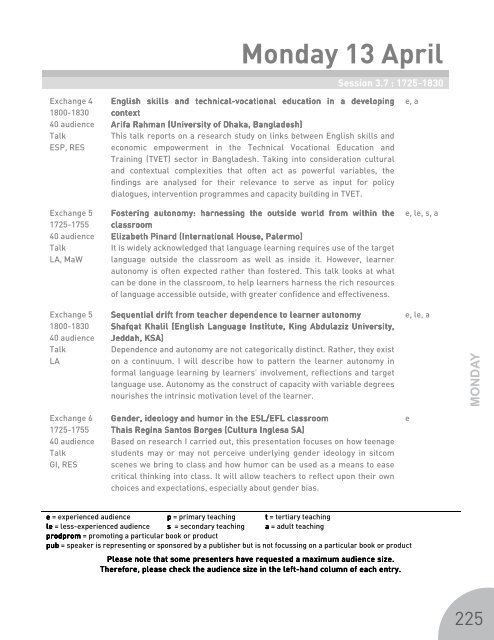Create successful ePaper yourself
Turn your PDF publications into a flip-book with our unique Google optimized e-Paper software.
Monday 13 April<br />
Session 3.7 : 1725-1830<br />
Exchange 4<br />
1800-1830<br />
40 audience<br />
Talk<br />
ESP, RES<br />
English skills and technical-vocational education in a developing<br />
context<br />
Arifa Rahman (University of Dhaka, Bangladesh)<br />
This talk reports on a research study on links between English skills and<br />
economic empowerment in the Technical Vocational Education and<br />
Training (TVET) sector in Bangladesh. Taking into consideration cultural<br />
and contextual complexities that often act as powerful variables, the<br />
findings are analysed for their relevance to serve as input for policy<br />
dialogues, intervention programmes and capacity building in TVET.<br />
e, a<br />
Exchange 5<br />
1725-1755<br />
40 audience<br />
Talk<br />
LA, MaW<br />
Fostering autonomy: harnessing the outside world from within the<br />
classroom<br />
Elizabeth Pinard (International House, Palermo)<br />
It is widely acknowledged that language learning requires use of the target<br />
language outside the classroom as well as inside it. However, learner<br />
autonomy is often expected rather than fostered. This talk looks at what<br />
can be done in the classroom, to help learners harness the rich resources<br />
of language accessible outside, with greater confidence and effectiveness.<br />
e, le, s, a<br />
Exchange 5<br />
1800-1830<br />
40 audience<br />
Talk<br />
LA<br />
Sequential drift from teacher dependence to learner autonomy<br />
Shafqat Khalil (English Language Institute, King Abdulaziz University,<br />
Jeddah, KSA)<br />
Dependence and autonomy are not categorically distinct. Rather, they exist<br />
on a continuum. I will describe how to pattern the learner autonomy in<br />
formal language learning by learners’ involvement, reflections and target<br />
language use. Autonomy as the construct of capacity with variable degrees<br />
nourishes the intrinsic motivation level of the learner.<br />
e, le, a<br />
MONDAY<br />
Exchange 6<br />
1725-1755<br />
40 audience<br />
Talk<br />
GI, RES<br />
Gender, ideology and humor in the ESL/EFL classroom<br />
Thais Regina Santos Borges (Cultura Inglesa SA)<br />
Based on research I carried out, this presentation focuses on how teenage<br />
students may or may not perceive underlying gender ideology in sitcom<br />
scenes we bring to class and how humor can be used as a means to ease<br />
critical thinking into class. It will allow teachers to reflect upon their own<br />
choices and expectations, especially about gender bias.<br />
e<br />
e = experienced audience<br />
le = less-experienced audience<br />
p = primary teaching<br />
s = secondary teaching<br />
t = tertiary teaching<br />
a = adult teaching<br />
prodprom = promoting a particular book or product<br />
pub = speaker is representing or sponsored by a publisher but is not focussing on a particular book or product<br />
Please note that some presenters have requested a maximum audience size.<br />
Therefore, please check the audience size in the left-hand column of each entry.<br />
225


